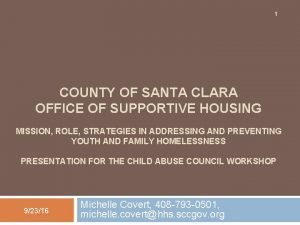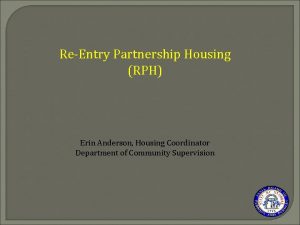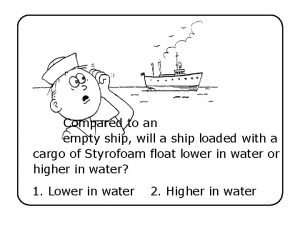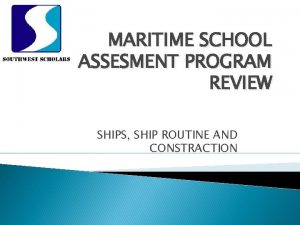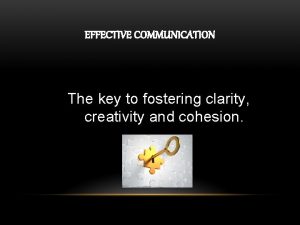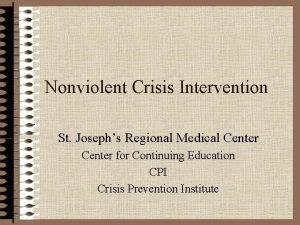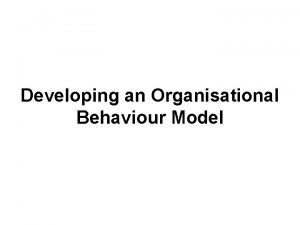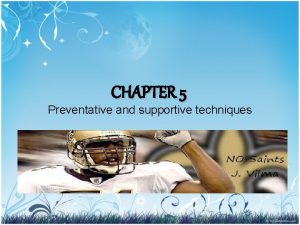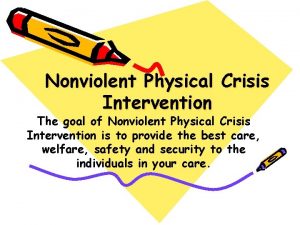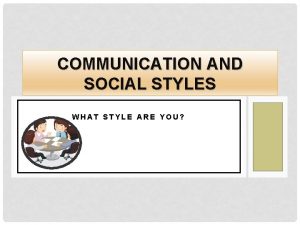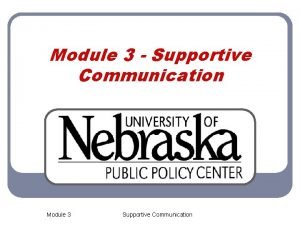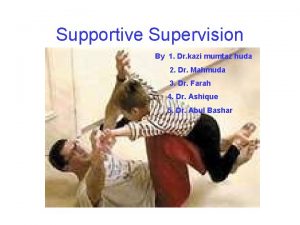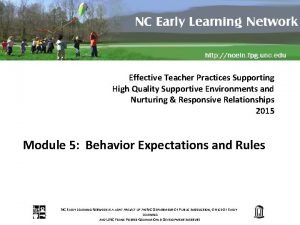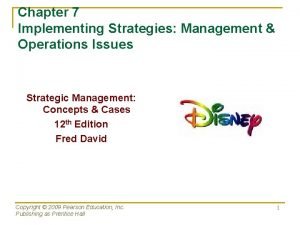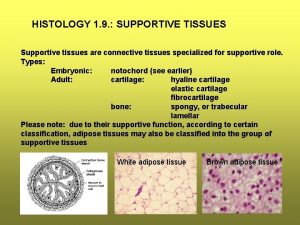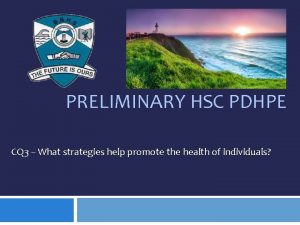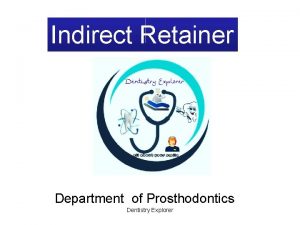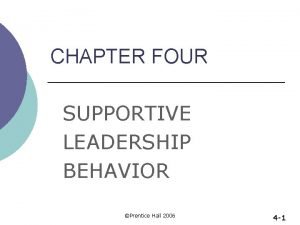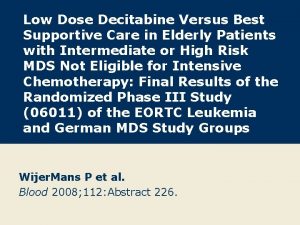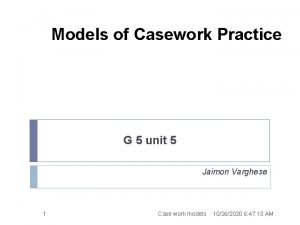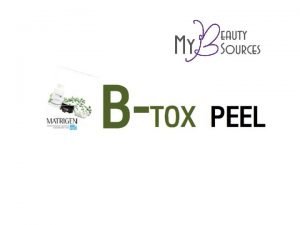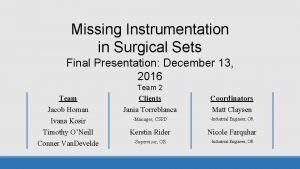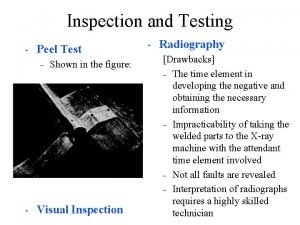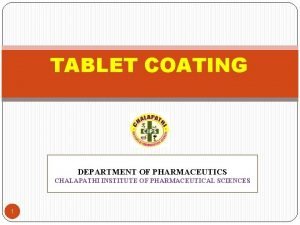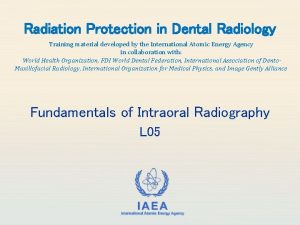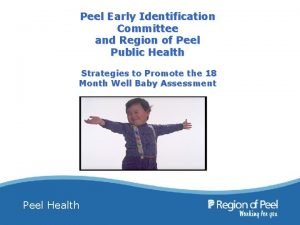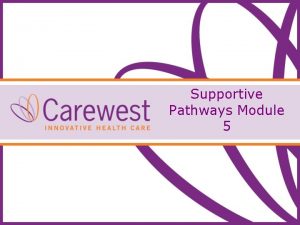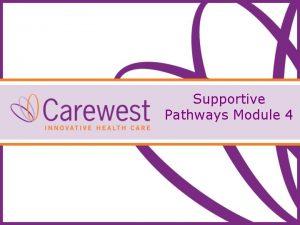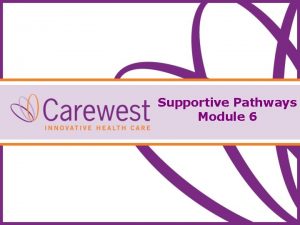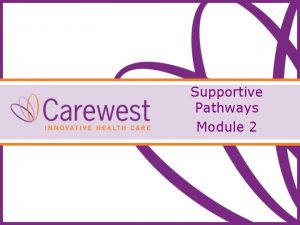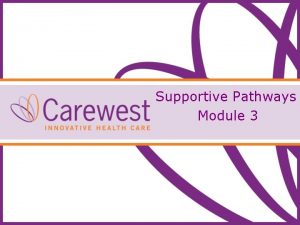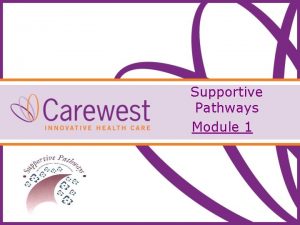SHIP Supportive Housing In Peel SHIP 1 Partnership





















































- Slides: 53

SHIP (Supportive Housing In Peel) SHIP 1

Partnership in Wellness and Recovery: Evidence-Based Psycho-Educational Group Presenters: Rekha Vaishnav, M. S. W. , R. S. W Olivia Forrest, Mental Health and Addiction Specialist SHIP 2

Overview of Presentation • SHIP: Organizational Description • Partnership in Wellness and Recovery : Conception, Challenges, Rationale for Evidence-Based Practice, Sessions in Detail, Pre and Post Findings • Ethics and Ethical Dilemma, Components of Ethical Decision Making, 4 A’s and 4 R’s • Framework for Resolving Ethical Dilemmas and Exploratory Exercise • Summary and Conclusion SHIP 3

Purpose of Presentation Participants will: • Hear about benefits of providing evidencebased services to families • Learn how to address ethical dilemmas while working with diverse communities • Discover ways to formulate a unique support group for families and significant others • Work on the framework to handle critical issues of ethical dilemmas SHIP 4

What is SHIP? • SHIP is a health service and housing support provider in Peel, West Toronto and Dufferin County SHIP 5

What SHIP Does • SHIP’s combination of safe, affordable housing and support is supplemented by psychosocial tools and resources to assist individuals along their road to mental and physical health and wellness recovery SHIP 6

Who SHIP Serves • SHIP provides housing and services for youth aged 16 to seniors • Applications are processed through SHIP’s Central Intake department SHIP 7

SHIP Teams Two Assertive Community Treatment Teams One Residential Multi-Service Team Early Intervention Team Two Short Stay Crisis Support Program Teams One Recovery Residence Team, two locations (Mississauga and Brampton) • One Assisted Living Program Team (SHALDufferin) • One Wellness and Recovery Co-ordinator • One Integrated Seniors Team • • • SHIP 8

SHIP Teams cont’d • • • One Central Intake and Assessment Team One Housing and Operations Team Two Social Purpose Enterprise Teams Problematic Substance Use Program The High Support Program Peel Youth Village In-STED Program Assisted Living Program One Critical Incident Stress Management Team

SHIP 10

Conception of Group • Personal passion and professional role • Faith in recovery • Need for creating a safe platform for family members • Need for strengthening the support network for caregivers • To establish a lasting partnership in wellness and recovery of ACT clients SHIP 11

Conception of Group cont’d • To expand the circle of care and increase the access to resources and options • To provide psycho-education to learn new coping skills • To understand the multidisciplinary model of ACT • To help members develop their own self-care plan SHIP 12

Challenges in Outreach • Inclusion of client and caregiver for the benefit of both • Determining a suitable time and venue that works for all participants • Commitment for attending all sessions • Language barrier • Team approach in promoting participation SHIP

Evidence-Based Practices (EBP) What is Evidence-Based Practice (EBP) ? • EBP is “the conscientious, explicit and judicious use of current best evidence in making decisions about the care of the individual patient. It means integrating individual clinical expertise with the best available external clinical evidence from systematic research. ” (Sackett D, 1996) SHIP 14

EBP cont’d • EBP is the integration of clinical expertise, patient values, and the best research evidence into the decision making process for the patient care. Clinical expertise refers to the clinician’s cumulated experience, education and clinical skills. The patient brings to the encounter his or her own personal preferences and unique concerns, expectations, and values. The best research evidence is usually found in clinically relevant research that has been conducted using sound methodology. (Sackett D, 1996) SHIP 15

EBP Clinical Expertise Best Research Evidence Patient Values & Preferences SHIP 16

How NPACTT Used Evidence. Based Practices • Step 1 - We assessed the client needs and discovered there was a disconnect between them and their loved ones in terms of understanding mental illness and the concepts of treatment and recovery • Step 2 - We asked the questions of loved ones as to what their needs were SHIP 17

How NPACTT Used Evidence. Based Practice cont’d • Step 3 - We acquired the evidence and conducted thorough research on family centered care • Step 4 - We appraised the evidence by conducting pre and post test questions • Step 5 - We applied what we learned and integrated this into our practice • Step 6 - We consistently self-evaluate SHIP 18

Rationale for Using Multi. Disciplinary Facilitation • Complex needs of ACT clients and multiple challenges • To bring the expertise to topics and provide the most effective problem-solving to manage the symptoms • To promote ACT Model • To recognize and appreciate the roles of different disciplines SHIP 19

Sessions 1 – 3 in Detail • Session 1: Introduction – purpose of group for family members, mental health facts, myths and stigma, pre -questionnaire, expectations and comfort agreement • Session 2: Mental health – definition and causes of mental illness, different types of mental disorders, introduction to DSM IV and DSM-5 • Session 3: Schizophrenia and mood disorders – complex diagnosis of ACT clients (ACT psychiatrist) SHIP 20

Sessions 4 – 5 in Detail • Session 4: Treatment and management of symptoms – medication compliance, side effects, impact of medications on physical health, Clozapine protocols, IM as treatment options (ACT nursing staff) • Session 5: Concurrent Disorder – substance use and mental illness, types of substances, challenges in treatment, stages of change, role of family members SHIP 21

Sessions 6 – 7 in Detail • Session 6: Living with mental illness – role of ACT OT; why assessment is necessary, fostering independence in ADL, role of family members (ACT OT) • Session 7: Coping – community resources; Form 1 and Form 2 in mental health, community treatment order, ODSP employment support, self-care plan (ACT social worker) SHIP 22

Sessions 8 – 9 in Detail • Session 8: Coping as a family – fostering recovery • Session 9: Closing remarks – postquestionnaire, dinner SHIP 23

Pre and Post Findings: North Peel ACT Family Meeting Pre and Post Results SHIP 24

Definition of Ethics The word ethics has Greek roots: • Ta ethica, referring to philosophical inquiry into good and evil • Ethos, meaning personal character (Burns, 2012) SHIP 25

Ethics is: “Our concern for good behaviour. We feel an obligation to consider not only our own personal well-being, but also that of other human beings. ” (Albert Schweitzer in Certo &Certo, 2009) SHIP 26

Code of Ethics for Social Workers • Maintain the best interest of client as the primary professional obligation • Carry out professional duties and obligation with integrity and objectivity • Protect the confidentiality of client’s information unless required by law • Advocate change in the best interest of the client and overall benefit of global community SHIP 27

Code of Ethics for Occupational Therapists • Possess qualities of integrity, loyalty and reliability • Value and respect client’s rights to be self-directed in their decision-making in accordance with their own needs, values and available resources • Ensure confidentiality and privacy of personal information • Recognize and manage issues related to conflict of interest SHIP 28

Code of Ethics for Nursing Professionals • Provide safe , compassionate, competent and ethical care • Promote health and well-being • Promote and respect informed decision making • Maintain privacy and confidentiality • Preserve dignity • Be accountable SHIP 29

Canon of Ethical Principles • Ensure that all interpersonal transactions between myself and persons served are nonexploitive and essential to their good recovery • Refrain from any activities, including the abuse of alcohol, drugs or other mood alternating chemicals where my personal conduct might diminish my personal capabilities, denigrate my professional status, or constitute a violation of law SHIP 30

Canon of Ethical Principles cont’d • Avoid claiming or implying any professional capabilities or professional qualifications beyond those I have actually attained, recognizing that competency gained in one field of activity must not be used improperly to imply competency in another • Believe in the dignity and worth of all human beings, and pledge my service to the well-being and betterment of all members of society SHIP 31

Ethical Dilemma • An ethical dilemma is a predicament where a person must decide between two viable solutions that seem to have similar ethical value. • Ethical dilemmas are situations arising when equally compelling ethical reasons both , for and against a particular course of actions are recognized and a decision must be made. SHIP 32

Components of Ethical Decision Making Establishing Personal Boundaries: Some healthcare professionals push the professional boundaries by sharing large amounts of personal information and experiences with colleagues and clients. Establishing rapport with co-workers and patients facilitates quality care. However, maintaining one’s professional role by limiting personal sharing helps to build the confidence of clients and co-workers in one’s competence and professional purpose. SHIP 33

Components of Ethical Decision Making cont’d Accepting Responsibility for Attendance and Timeliness: Some refer to a good attendance record and reporting for work on time as a reflection of a “work ethic. ” SHIP 34

Components of Ethical Decision Making cont’d Documenting Scrupulously: “Certainly P&P and the law identify sound documentation practices. Yet sometimes healthcare professionals make a quick checkmark for an activity they intend to complete, but for whatever reason they do not. ” (Kearney & Penque, 2012) SHIP 35

Components of Ethical Decision Making cont’d Truth-Telling in Disclosing Errors and Near Misses: Clients and their families have the right to know about errors in their care and delivery of service. Such disclosures are not only ethically important, but also discourage allegations of misconduct or malpractice. However, it is critical that healthcare professionals learn the organization’s P&P for these situations and follow the P&P carefully. SHIP 36

4 A’s and 4 R’s • The 4 A’s and 4 R’s can assist healthcare professionals to address the moral distress that arises when they encounter situations in which they feel unable to act consistent with their personal values • (AACN, n. d. ). Further information about this model and examples: http: //www. aacn. org/WD/Practice/Docs/4 As to Rise Above Moral Distress. pdf SHIP 37

4 A’s and 4 R’s cont’d • 1. Ask – Reflect to become aware of your feelings of moral distress. Are you and/or team members experiencing moral distress? • 2. Affirm – Validate your feelings with others and make a commitment to address moral distress. SHIP 38

4 A’s and 4 R’s cont’d • 3. Assess – Assess the degree of your distress and your readiness to act • 4. Act – Make a personal and professional action plan. Carry it out and act to sustain the change. SHIP 39

4 A’s and 4 R’s cont’d • 1. Relevance – In what ways and to who is the issue important? • 2. Risks – What are the risks of taking action and/or not taking action? • 3. Rewards – What benefits can be obtained by acting and various courses of action? • 4. Roadblocks – What are the barriers to taking action or a particular course of action? SHIP 40

The Four Components Model (FMC) Component 1: Ethical Sensitivity • Becoming aware of and interpreting the reactions and feelings of others. Component 2: Ethical Judgment • Determining that an ethical situation exists and requires action, and then deciding which course of action is the most justifiable in the situation. SHIP 41

The Four Components Model (FCM) cont’d Component 3: Ethical Motivation • Desiring to be ethical and to act and live in a manner consistent with one’s moral values. • Moral courage is “the individual’s capacity to overcome fear and to stand up for his or her core values. ” (Lachman, 2007, p. 131) SHIP 42

The Four Components Model (FCM) cont’d Component 4: Ethical Action • Determining the best way to implement the chosen decision and having the ability and confidence to persist to completion. • “A given situation has ethical content when an action freely performed or not performed has the potential to harm or benefit others. ” (Robichaux, 2012, p. 69) SHIP 43

A Framework for Resolving Ethical Dilemmas in Healthcare 1 2 3 Identify Clarify Clarify Ethical Values Influencing Issue Factors and Barriers 4 5 6 Define Analyze Find Guiding Alternatives Common Principles Ground 7 8 Decide Assess and Act Outcome

Ethical Exploratory Exercises Scenario #1: Values versus Need (Job Search) Scenario #2: Client’s Right to Make Choices Scenario #3: Confidentiality: Not an Exception but an Expectation Scenario #4: Hospitalization Vs Homelessness SHIP 45

Summary Lessons Learned: • Collaboration with family members to find and maintain a fine balance between protecting the rights and welfare of ACT clients and meeting expectations of their family members • Working through an ethical dilemma involves keeping an open mind and not allowing ourselves to be motivated by our own biases SHIP 46

Summary cont’d Ways to Handle Ethical Dilemmas: • Consult supervisors • Use online network and research • Discuss with clients • Discuss with the circle of care • Create and use professional forums • Consult with professional licensing bodies • Need for training supervisors on ethical issues and dilemmas SHIP 47

Moving Forward Family Support Group and Ethical Dilemmas: • Inclusion of topics related to ethical dilemmas in the contents of psycho-education workshops • Discuss about organizational policies around professional ethics • Family support groups as a platform for discussing solutions for ethical issues • Family support groups as an opportunity to learn more about mental health and recovery as viewed by diverse communities SHIP 48

Contact Us 969 Derry Road East Suite 107 Mississauga, ON L 5 T 2 J 7 SHIP’s main switchboard: 905 -795 -8742 SHIP’s Central Intake: 905 -795 -8742 Ext 233 info@shipshey. ca SHIP 49

THANK YOU ! • rekha. vaishnav@shipshey. ca • olivia. forrest@shipshey. ca SHIP 50

References • American Association of Critical Care Nursing (AACN). (2004). The 4 A’s to Rise Above Moral Distress. Retrieved August 2014 from: • http: //www. aacn. org/WD/Practice/Docs/4 As to_Rise_Above_Moral_Distress. pdf. • Burns, S. A. (last updated June, 2012). Evolutionary pragmatism, A disclosure on a modern philosophy for the 21 st Century. The purpose of Ethics. Retrieved August 2014 from: • http: //www 3. sympatico. ca/saburns/index. htm. SHIP 51

References cont’d • Kearney, G & Penque, S. (2012). Ethics of Everyday Decision Making. Nursing Management, 19(1), 32 – 36. • Lachman, V. (2007). Moral Courage: A virtue in Need of Development? Medsurg Nursing, 16(2), 131 – 133. • Rest. J. R. (1986). Moral Development: Advances in Research and Theory. New York, NY: Praeger. • http: //www. ocswssw. org/en/professionalpractice. htm • http: //cna-aiic. ca/en/on-the-issues/best-nursing/nursing -ethics SHIP 52

References cont’d • Robichaux, C. (2012). Developing Ethical Skills: From Sensitivity to Action. Critical. Care. Nurse, 32(2), 66 – 72. • www. socialworktoday. com/news/eoe_101402. shtm SHIP 53
 Fortune society scattered site housing
Fortune society scattered site housing Office of supportive housing santa clara county
Office of supportive housing santa clara county Supportive housing providers association
Supportive housing providers association Reentry partnership housing
Reentry partnership housing East london housing partnership
East london housing partnership Compared to an empty ship the same
Compared to an empty ship the same Ship ship routines and construction
Ship ship routines and construction Supportive communication style
Supportive communication style Auxiliary team member duties cpi
Auxiliary team member duties cpi Histology smooth muscle
Histology smooth muscle The autocratic model
The autocratic model The supportive techniques are
The supportive techniques are Verbal escalation continuum cpi
Verbal escalation continuum cpi Supportive stance position posture proximity
Supportive stance position posture proximity Amiable communication style
Amiable communication style Assignment point
Assignment point Directive behavior
Directive behavior What is supportive communication
What is supportive communication High directive and low supportive behavior
High directive and low supportive behavior Dr farah kazi
Dr farah kazi High quality supportive environments
High quality supportive environments Creating a strategy supportive culture
Creating a strategy supportive culture Types of discipline
Types of discipline Supportive tissues
Supportive tissues Principle of supportive relationship
Principle of supportive relationship Creating supportive environments smoking
Creating supportive environments smoking Tissue ward movement
Tissue ward movement Precipitating factors cpi
Precipitating factors cpi Supportive leadership behavior
Supportive leadership behavior Director communication style
Director communication style Supportive stance meaning
Supportive stance meaning Supportive communication examples
Supportive communication examples Supportive
Supportive Social case work models
Social case work models Peel past tense
Peel past tense Skrivedag
Skrivedag B tox peel
B tox peel Covm de peel
Covm de peel Peel character traits
Peel character traits What is igcse
What is igcse Myblueprint peel
Myblueprint peel Cspd peel pack
Cspd peel pack Disha moses
Disha moses Peel test welding
Peel test welding Standard coating pan diagram
Standard coating pan diagram Past form of peel
Past form of peel Peel method
Peel method 9 principios de robert peel
9 principios de robert peel Peel paragraph structure
Peel paragraph structure Afvalinzameling horst aan de maas
Afvalinzameling horst aan de maas Onion peel diagram
Onion peel diagram Cells observed in an onion peel
Cells observed in an onion peel Rohacell 71 wf
Rohacell 71 wf Common causes of faulty radiographs
Common causes of faulty radiographs

